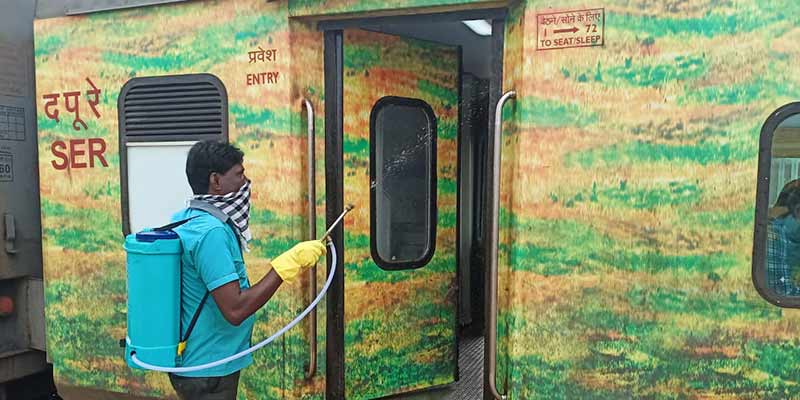- India
- Sep 22
- Mathew Gregory
Measures undertaken by Indian Railways for hygiene and sanitation & new rail lines
Cleanliness is a continuous process and every endeavour is made to keep the stations/platforms and passenger carrying trains in properly maintained and clean condition. Regular checks on cleanliness are conducted and corrective action taken wherever any deficiency is noticed. However, few complaints are received. All efforts are made by the Railways to address the complaints.
Measures undertaken by Indian Railways to provide necessary facilities for comfortable travel
a. Provision of energy efficient LED lights in coaches for better illumination.
b. Provision of mobile/laptop charging points in all types of coaches.
c. Provision of stainless steel seats and partitions, knurling of door centre grip poles, air suspension bogies for better riding comfort, GPS based Passenger Information System (PIS), bigger windows with polycarbonate panes, automatic sliding door system in Air conditioned EMU rakes etc. in suburban trains.
d. In view of COVID-19 pandemic and related hygiene issues, Indian Railways has stopped service of cooked food and replaced the same with Ready to Eat (RTE) meals in trains. COVID-19 related protective items such as masks, sanitizers, gloves etc. and takeaway bedroll kits/items, have been made available for sale through Multi-Purpose Stalls at Stations.
e. State-of-the-art Train-set Vande Bharat services have been introduced between New Delhi – Varanasi and New Delhi – Shri Mata Vaishno Devi Katra. These trains have ultra-modern features like quick acceleration, On Board Infotainment and Global Positioning System (GPS) based passenger information system, automatic sliding doors, retractable footsteps and Zero discharge vacuum bio-toilets etc.
f. Various premium train services like Humsafar, Tejas, Antyodaya, Utkrisht Double Decker Air–conditioned Yatri (UDAY), Mahamana and coaches like Deen Dayalu and Anubhuti, which have upgraded interiors/exteriors and improved passenger amenities, have been introduced in various train services.
g. Project Utkrisht has been launched to improve the condition of ICF type coaches running in Mail/Express trains. 416 rakes have been refurbished under Project Utkrisht.
h. Under Project Swarn, Rajdhani and Shatabdi train services have been upgraded across various dimensions, which include coach interiors, toilets, onboard cleanliness, staff behaviour, catering, punctuality, security and on-board entertainment. 65 rakes have been upgraded under this initiative.
Major initiatives taken by Indian Railway towards improvement of cleanliness of stations and trains
a. Introduction of mechanized cleaning contracts at around 950 stations and award of rag picking and garbage disposal contracts at around 1300 stations.
b. Provision of Concrete washable aprons on platform tracks to facilitate washing with water jets.
c. Provision of clean and hygienic toilets including Pay and Use Toilets at around 850 stations.
d. Use of CCTVs has been intensified for monitoring of cleanliness activities at about 700 stations.
e. Plastic Bottle Crushing machines have been installed at 370 stations.
f. Bio-toilets have been proliferated on coaching stock so that no human waste is discharged from coaches on to the track. Nearly, 2,44,000 bio-toilets have been fitted in around 69,000 coaches.
g. Cleaning of coaches including toilets of trains is done at both ends including mechanised cleaning.
h. On Board Housekeeping Service (OBHS) has been provided in nearly 1100 pairs of important long distance Mail/Express trains for cleaning of coach toilets, doorways, aisles and passenger compartments during the run of the trains.
i. ‘Coach Mitra’ service has been provided in around 1060 pairs of OBHS trains as a single window interface to register coach related requirements of passengers such as cleaning, disinfestation, linen, train lighting, air conditioning and watering of coaches.
j. 39 Clean Train Station (CTS) are operational for limited mechanized cleaning attention to identified trains enroute.
k. Pest and rodent control of coaches is being done on a regular basis through authorised professional agencies.
l. Dustbins are provided in AC and non-AC Coaches.
m. Enforcement of Indian Railways (Penalties for activities affecting cleanliness at Railway Premises) Rules, 2012 has been intensified.
n. Standard Bid Document (SBD) and General Conditions of Contract for Services (GCCS) have been issued to improve effectiveness of housekeeping / cleaning contracts.
o. Third Party audit cum survey on cleanliness of major stations and trains has been carried out to instill healthy competition for improvement.
p. Cleanliness drives and awareness campaign are also conducted from time to time.
New Rail projects
• Railway Projects are sanctioned Zonal Railway wise, not State wise as Indian Railways’ network spans across various State boundaries.
• As on 01.04.2020, total 513 projects (189 New line, 54 Gauge Conversion and 270 doubling) covering a total length of 53,039 Km, out of which 10,013 Km length has been commissioned
• An expenditure of ₹ 1.86 Lakh Crore has been incurred up to March,2020.
• During 2014-19 total 13,124 Km length (New line, Gauge conversion and Doubling) has been commissioned on Indian Railways, which is 73% more than during 2009-14 (7,599 Km).
• Average annual expenditure for New lines, Gauge Conversion and Doubling projects over Indian Railways during 2014-19 has increased to ₹ 26,026 Cr/year from ₹ 11,527 Cr/year (during 2009-14) which is 126% more than during 2009-14.
• The expenditure during 2019-20 further increased to ₹ 39,836 Cr., which is 246% more than average annual expenditure of 2009-14 and the highest ever expenditure in any financial year.
Determinants of Rail projects
• quick land acquisition by State Government
• forest clearance by officials of forest department
• shifting of infringing utilities
• statutory clearances from various authorities
• geological and topographical conditions of area
• law and order situation in the area of project site
• number of working months in a year for particular project site due to climate conditions etc.
(The author is a trainer for Civil Services aspirants. The views expressed here are personal.)

